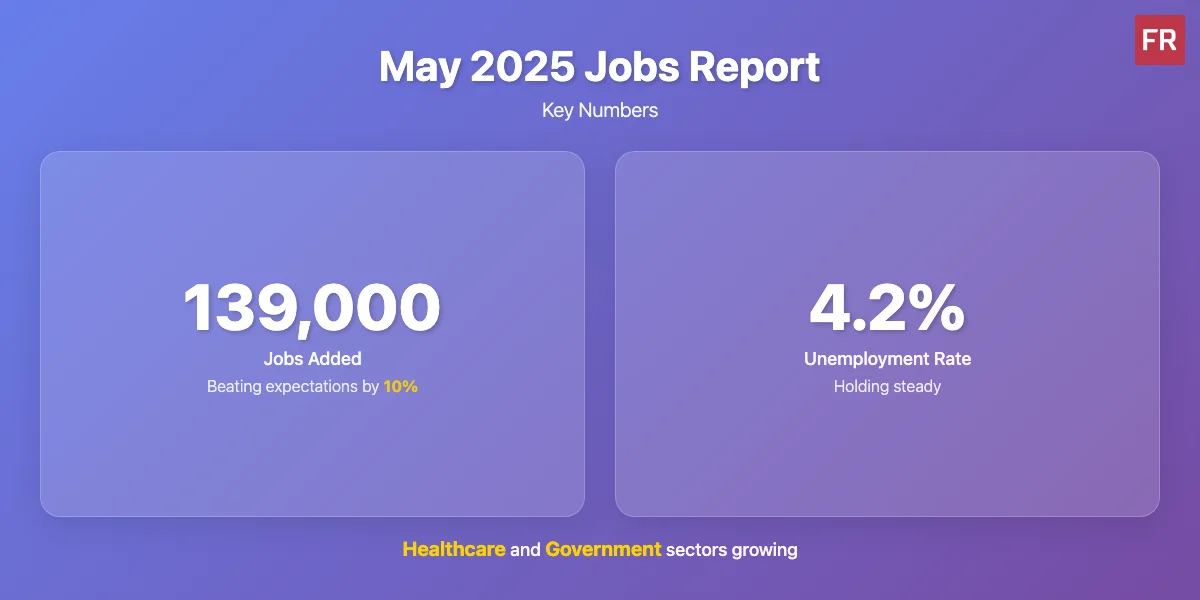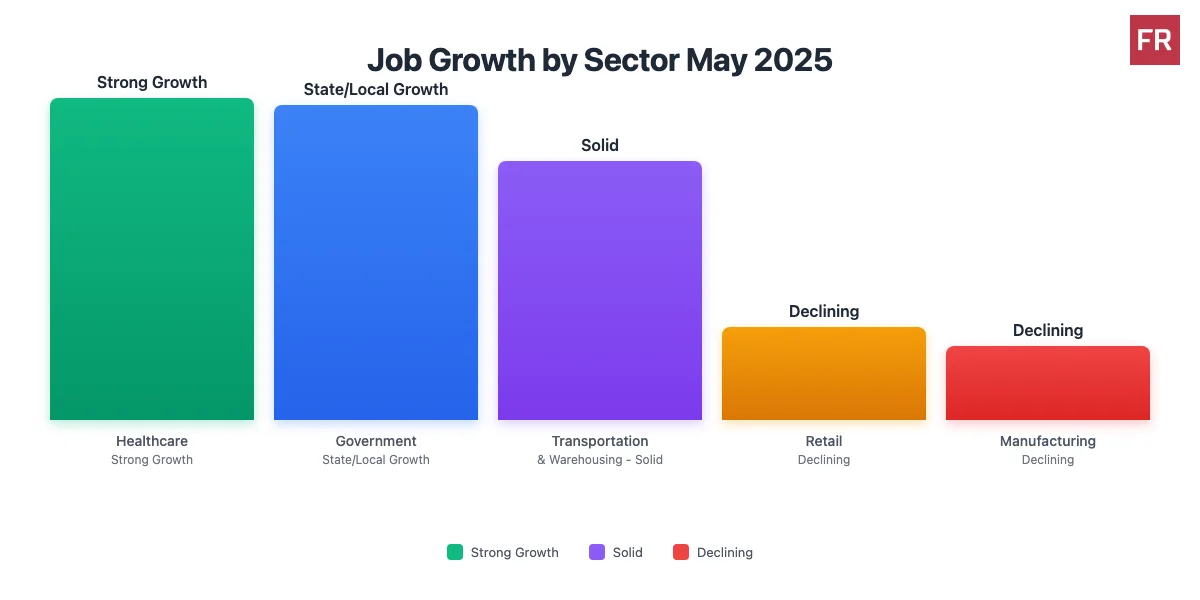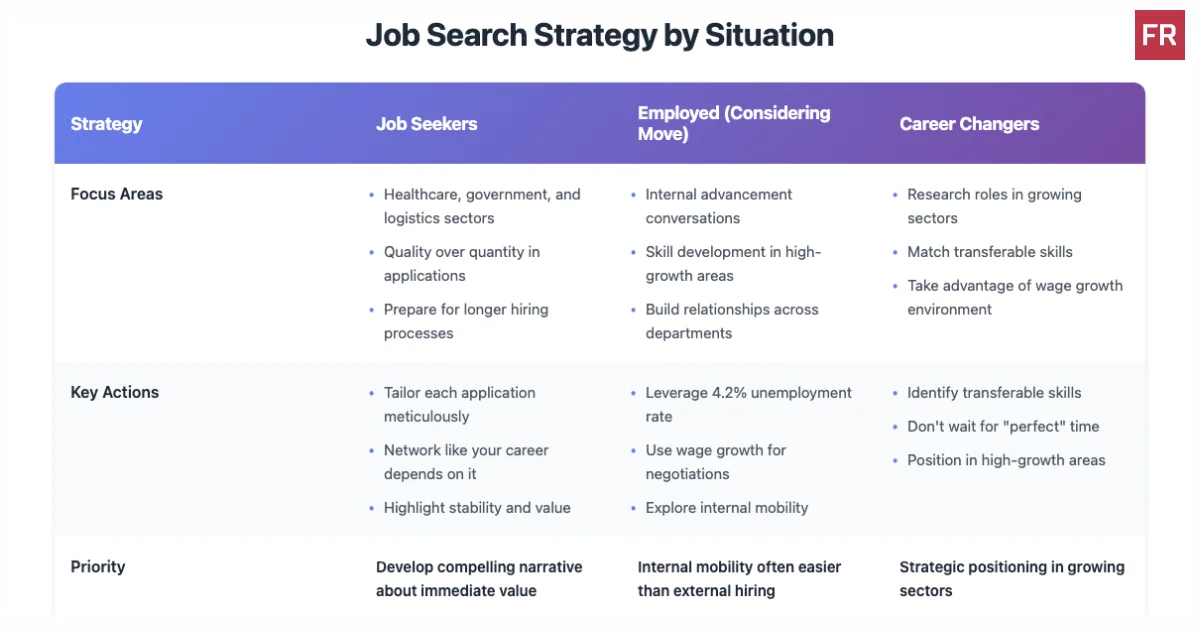What the May 2025 Jobs Report Really Means for Your Career (And Why You Shouldn't Panic)
Picture this: You're scrolling through your LinkedIn feed on a Friday evening, and suddenly you're bombarded with headlines about "slowing job growth" and "economic headwinds." Your stomach drops a little. Should you be worried about your job? Is now a terrible time to make a career move?
Here's the thing – I've been watching these monthly jobs reports for years, and I can tell you that the May 2025 numbers tell a much more nuanced story than the doom-and-gloom headlines suggest. Let me break down what's really happening and, more importantly, what it means for you.

The Real Story Behind the Numbers
Yes, the U.S. added 139,000 jobs in May – which sounds modest until you realize economists only expected 125,000. That's actually beating expectations by more than 10%. The unemployment rate? Still sitting pretty at 4.2%, exactly where it was in April, according to the U.S. Bureau of Labor Statistics May 2025 Employment Situation Summary.
But wait, there's more to unpack here. What I find fascinating is the tale of two job markets emerging from this data.
Read our career advice articles to learn more about navigating the job market.
Where the Opportunities Are (And Where They're Not)
If you're in healthcare, congratulations – you're in the driver's seat. Healthcare and social assistance continue to be absolute job creation machines. With an aging population and ongoing demographic shifts, this sector isn't just growing; it's practically screaming for talent.
I recently spoke with a healthcare recruiter who told me she has three times more open positions than qualified candidates. If you're considering a career pivot, this might be your moment. Learn more about healthcare career opportunities and how to transition into this growing field.
Government jobs are also making a comeback, which is interesting given all the talk about federal cuts. Here's the insider scoop: while federal positions dropped by 59,000 since January (part of those efficiency initiatives you've heard about), state and local governments are more than picking up the slack. Think about it – infrastructure projects, education, and local services still need people to run them.
Transportation and warehousing? Still solid. Every time you order something online, you're contributing to this sector's strength. The logistics revolution isn't slowing down anytime soon.

The Reality Check: Where It's Getting Tough
Now, let's talk about the challenging sectors – because ignoring them won't help anyone.
Retail is struggling, losing several thousand jobs in May according to the Bureau of Labor Statistics. But honestly, this isn't shocking news if you've been paying attention. The shift to e-commerce has been reshaping retail for years. If you're in traditional retail, it's time to think about transferable skills. Customer service, inventory management, and sales experience translate beautifully to other industries.
Manufacturing showed a decline in employment, continuing a trend we've seen throughout 2025, according to BLS data. Trade policy changes and tariff uncertainties are making businesses cautious. If you're in manufacturing, consider how your technical skills might apply in growing sectors like renewable energy or advanced logistics.
What This Means for Your Job Search Strategy
Here's where it gets practical. According to ADP's National Employment Report, the private sector added only 37,000 jobs – the lowest in over two years. But before you panic, remember that businesses being cautious doesn't mean they're not hiring. It means they're being more selective.
For job seekers, this translates to:
- Quality over quantity in applications – Tailor each application meticulously
- Network like your career depends on it – Because in a cautious market, referrals matter more than ever
- Highlight stability and value – Show how you'll contribute from day one
For those employed but considering a move:
The steady 4.2% unemployment rate and robust wage growth mean you still have bargaining power. According to the Bureau of Labor Statistics, average hourly earnings continue to rise, and employers are maintaining hours for existing staff. Translation? They value their current workforce and are willing to pay to keep good people.

The Bigger Picture: Why This Isn't 2008
I lived through the 2008 financial crisis as a career counselor, and let me tell you – this feels completely different. Back then, we saw massive layoffs and unemployment spiking to over 10%. Today, we're seeing moderation, not collapse.
The Federal Reserve is likely viewing these numbers as evidence that their strategy is working – cooling things down without triggering a recession. That "soft landing" scenario everyone talks about? These numbers support it.
Your Action Plan for the Next 90 Days
If you're job searching:
- Focus heavily on healthcare, government, and logistics sectors
- Prepare for longer hiring processes as companies become more deliberate
- Develop a compelling narrative about how you add immediate value
If you're employed:
- This is actually a great time for internal advancement conversations
- Consider skill development in high-growth areas
- Build relationships across departments – internal mobility is often easier than external hiring
If you're considering a career change:
- Research roles in growing sectors that match your transferable skills
- Take advantage of the current wage growth environment to negotiate
- Don't wait for the "perfect" time – there rarely is one
The Bottom Line
The May 2025 jobs report isn't telling us the sky is falling. It's telling us the job market is maturing, becoming more strategic, and yes, a bit more competitive. But for savvy job seekers and career-minded professionals, this environment actually presents opportunities.
The fundamentals remain strong: unemployment is low, wages are growing, and certain sectors are absolutely booming. The key is being smart about where you focus your energy and how you position yourself.
What's your next move? I'd love to hear how you're navigating this job market. Are you seeing these trends play out in your industry? Drop a comment below or connect with me – let's figure out your best path forward together.
Remember, every economic cycle creates winners and losers. The difference often comes down to who adapts fastest and positions themselves smartest. You've got this.
Ready to put these strategies into action? Browse open positions on foundrole.com and find your next opportunity.